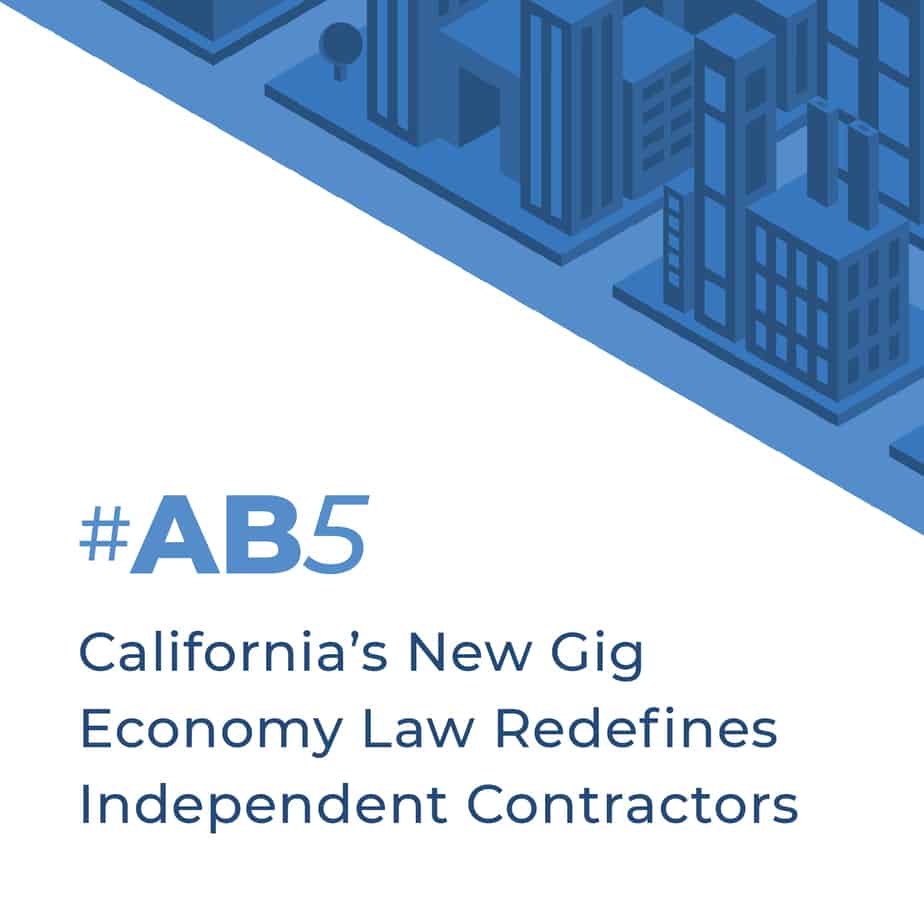California’s New Gig Economy Law Redefines Independent Contractors

A dog walker, a freelance journalist, and a yoga teacher walk into a bar. What do they talk about? Besides the fact that they shouldn’t have majored in English, probably California’s new gig economy law. Assembly Bill 5 has the potential to affect each of them, and probably the bartender, too. Intended to reign in the misclassification of independent contractors and extend employee protections to gig workers, the law went into effect at the beginning of this year, bringing chaos, confusion, and even layoffs.
California independent contractors have been waiting on tenterhooks to see how the law will affect their livelihoods. Some hope that forming a California LLC will establish independence from clients and help them get around the law. A few months into 2020, there are more questions than answers, but here’s what we know so far.
What does AB-5 do?
California Assembly Bill 5 narrowly redefines how California businesses can classify independent contractors using the so-called ABC Test. To be legally classified as an independent contractor, the worker must:
A) be free from control and direction of the business;
B) perform work outside the usual course of the hiring entity’s business; and
C) be customarily engaged in an independently established trade, occupation, or business of the same nature as the work performed.
The ABC Test was first adopted in California after the state’s landmark Supreme Case decision Dynamex Operations West, Inc. v Superior Court (2018). Dynamex, a delivery business, suddenly converted all driver employees to independent contractor status and required them to pay for their own fuel, tolls, car insurance, maintenance, and workers’ compensation insurance. Drivers brought a class action suit against Dynamex, arguing that the company had misclassified them. The California Supreme Court ruled in favor of the drivers, and in doing so, adopted the ABC Test for defining independent contractors.
Under the law, some kinds of work are exempt from the ABC test but restricted in other ways. For example, freelance writers and photographers are limited to 35 submissions per publication, per year (though litigation may soon change that.) As a result, Vox Media recently ended freelance contracts with hundreds of California journalists.
If you’re an independent contractor, you don’t have to prove that you can pass the ABC Test. It’s up to business owners to demonstrate that workers are classified correctly under the law, but they may be afraid to hire you if you can’t pass the ABC Test.
Who does AB-5 affect?
Much of the national conversation around AB-5 has centered around the big Silicon Valley companies that are driven – literally – by hundreds of thousands of independent contractors: Uber, Lyft, and Doordash. Uber has already made changes in California, giving drivers more freedom, while also pledging millions of dollars to pass a ballot initiative to exempt the company.
However, ride-hailing apps and delivery companies aren’t the only ones who need to rethink business plans to avoid litigation. Independent contractors and any small businesses that hire them will be affected.
For some, proving that an independent contractor performs work that is outside of the usual course of the entity’s business is the most difficult portion of the test. The California Labor & Workforce Development Agency gives the following examples of workers who fail part B:
- “When a clothing manufacturing company hires work-at-home seamstresses to make dresses from cloth and patterns supplied by the company that will thereafter be sold by the company.”
- “When a bakery hires cake decorators to work on a regular basis on its custom-designed cakes.”
In both examples, the worker is performing work that is integral to the company’s business and similar to the work done by regular employees. Examples of independent contractors who pass Part B include:
- “When a retail store hires an outside plumber to repair a leak in a bathroom on its premises.
- “When a retail store hires an outside electrician to install a new electrical line.”
Building maintenance has nothing to do with retail, so those workers are easily classified as independent contractors.
Some professions are exempt from AB-5, like real estate agents, engineers, carpenters, plumbers, dentists, doctors, lawyers, veterinarians, accountants, and some creative professionals. Many other groups are embroiled in legal battles to win exemptions from the law. For example, the California Trucking Association recently won an injunction to stop the law from applying to truckers.
How are independent contractors responding to AB-5?
AB-5 is steering California’s gig economy into uncharted waters, and many tenets of the law have yet to be tested in court. Supporters hope it will extend sorely needed protections to misclassified workers, while opponents fear it will cripple the small businesses that depend on independent contractors.
California independent contractors are understandably afraid of losing the flexible livelihoods they’ve built. In response, many are looking for workarounds, and one has gained some traction: forming a California LLC.
Quartz recently reported a spike in new LLCs formed in California that coincides with the roll-out of the new law. The untested theory is that starting a California LLC will help freelancers establish independence from the businesses that hire them. California’s $800 franchise tax will undoubtedly deter many freelancers from forming LLCs, and the only way to avoid the California franchise tax is to operate as a sole proprietor.
Will the LLC workaround help independent contractors retain work? That question, among many others, remains to be seen.



